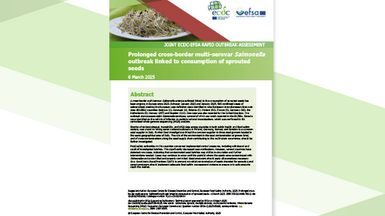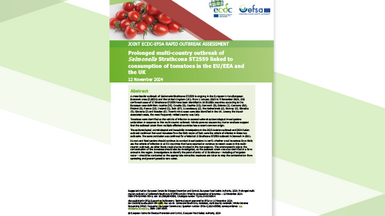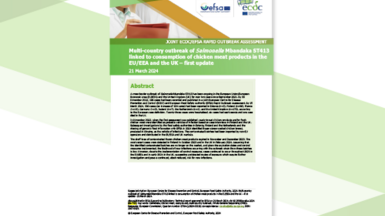Joint Rapid Outbreak Assessment: Multi-country outbreak of Salmonella Enteritidis phage type 8, MLVA type 2-9-7-3-2 and 2-9-6-3-2 infections, 27 October 2016
From 1 May 2016 to 12 October 2016, seven EU/EEA countries have reported 112 confirmed cases and 148 probable cases of Salmonella Enteriditis. This document assesses the risk associated with this multi-country outbreak of Salmonella Enteritidis PT 8 associated with two MLVA types, initially confirmed and delineated by whole genome sequencing methods.
See the separate annexes below.
Executive Summary
From 1 May 2016 to 12 October 2016, seven EU/EEA countries have reported 112 confirmed cases and 148 probable cases of Salmonella Enteritidis.
Based on Whole Genome Sequencing (WGS) analysis, the isolates are part of two distinct but related genetic clusters.
The countries where cases have been reported so far are Belgium, Denmark, Luxembourg, the Netherlands, Norway, Sweden, and the United Kingdom. Nine of the confirmed cases are associated with a travel history to Hungary or Poland, thus the two countries are also considered to be affected by this outbreak. In addition, Croatia reported a cluster of S. Enteritidis cases, including a fatal case, with an epidemiological link to the outbreak.
Extensive environmental and food investigations, as well as the results of the WGS and the tracing-back investigation of eggs, establish a link between the outbreak and an egg packing centre in Poland. Competent authorities in Poland and in EU Member States where eggs from the facility were distributed have already introduced restrictive measures to withdraw the product and stop its distribution in the market.
ECDC and EFSA are liaising with relevant authorities in the Member States and at the EU level to facilitate the coordination of investigation and response measures, and encourage countries to keep sharing information through the Epidemic Intelligence Information System for food- and waterborne diseases (EPIS FWD), and to notify using the Rapid Alert System for Food and Feed (RASFF), and the Early Warning and Response System (EWRS).
Download
Publication data
Data
Annex 2a: ECDC/EFSA ROA - Salmonella Enteritidis in Europe
From 1 May 2016 to 12 October 2016, seven EU/EEA countries have reported 112 confirmed cases and 148 probable cases of Salmonella Enteriditis.
Data
Annex 2b: ECDC/EFSA ROA: Salmonella Enteritidis in Europe
From 1 May 2016 to 12 October 2016, seven EU/EEA countries have reported 112 confirmed cases and 148 probable cases of Salmonella Enteriditis.







